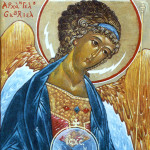During the summer of 2002 I owned neither watch nor cell phone. Indeed I mocked the notion: “Look at me, I need to know what time it is!” I would say in the voice of my pretentious watch-wearing alter ego, while in reality I was just out of college, unemployed, and rather short on social engagements.
My only semblance of routine came on Sunday morning as I prepared for the 8:15 liturgy at Augustana Lutheran Church of Hyde Park. I lived in the majestically crumbling building adjacent to the Metra station on 57th street. On Sunday I would stop for a pastry and a coffee at the Medici bakery and sit in the park. Mrs. Gorder, the pastor’s wife, would reliably cross the park on her way to church, signalling to me that the hour was nigh.
Thicken those bonds of infrastructure, space, and culture that tie up the various peoples of any metropolis, ancient or modern, into bonds of love, and there you have heaven.
Thicken those bonds of infrastructure, space, and culture that tie up the various peoples of any metropolis, ancient or modern, into bonds of love, and there you have heaven.
At the end of the summer I acquired a job, a cell phone, and an apartment on the north side. And while I had to get to church on my own recognizance, I ran into my fellow Lutherans all over the neighborhood. It was, in retrospect, something that drew me to the church in the first place: the experience of being part of a community within the larger community around us; of being distinct in the world, and yet not at all separate. The metaphor of the city – from Revelation to Augustine and beyond – for the new and coming kingdom of God has always made perfect sense to me. The immense integration required of even the most badly-governed, badly-organized city is something close to a miracle. Thicken those bonds of infrastructure, space, and culture that tie up the various peoples of any metropolis, ancient or modern, into bonds of love, and there you have heaven.
And yet the city itself is an ambivalent figure in our tradition. Urban areas don’t come off too well in Genesis, housing fratricides and rapists. Diasporic Judaism and early Christianity were largely urban phenomena, it is true, and the great medieval centers of learning and theology were often (though not always) in large cities. But in white American Protestantism the city became pathologized. It was the target of reforming and missionary zeal in the late 19th century. In the 20th century, you could choose to view the city as the object of social justice and welfare, or as the den of iniquity, race mixing, and secularism. The close, religiously polarized presidential elections of 2000 and 2004 tended to exagerate the distinction between a pious, rural “real America” – or “Jesusland” as one regrettably snarky progressive wit had it – and a secularized, deracinated urban margin. More subtly, we Americans are heirs to a somewhat naturalistic spiritual tradition that finds transcendence in long woodland walks. Relatively few of our writers ever met God in a crowd.
Which is a shame, because in my experience the city is still charged with possibility, which is to say with theology. I was an intern at a parish that had gone, years before I arrived, from being all white to all black and that faithfully served its neighbors as it always had. I served my first call in a parish that somehow, by the skin of its teeth, sailed through at least four ethnic transitions and a riot. I can still remember vividly the feeling of awe that opened within me as I slipped into St. Peter’s Episcopal Church on Belmont, small from the bustling neon street but solemn, gorgeous, and cavernous within. It was Epiphany 2003 and there was incense, a chanted Gospel, and other people young and old just steps away from a world that took no note of what was happening there, that in fact no longer had words for it. That there are places where the generations and races meet, places where a seat doesn’t come with a fee, places that are beautiful and where songs are sung together and where words are offered up simply for the good of the hearer – it is not a small thing in an environment propelled by cash, connections, and buzz.
We are becoming ever more enmeshed with each other, ever more likely to live close together and in daily need of something like kindness and civility.
We are becoming ever more enmeshed with each other, ever more likely to live close together and in daily need of something like kindness and civility.
We miss the significance of these things at peril to ourselves and our proclamation of the Gospel. The world is urbanizing. In this, if in nothing else, the Bible’s journey from a hunter-gatherer’s Garden to a holy City seems to be prescient. Even in supposedly wide-open America, the population is moving toward metropolitan areas (our country would be more densely built than it is if building restrictions didn.t make true urbanism impossible virtually everywhere). We are becoming ever more enmeshed with each other, ever more likely to live close together and in daily need of something like kindness and civility. We are becoming a city. The only question is how finely the grid of streets, the rush of trains, and the melding of peoples will be latticed with the bonds of love.


